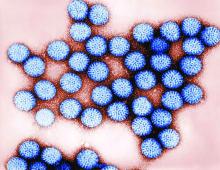A new oral rotavirus vaccine administered within the first few days of life appears effective against severe rotavirus gastroenteritis in newborns, a study has found.
Julie E. Bines, MD, from the RV3 Rotavirus Vaccine Program at the Murdoch Children’s Research Institute in Melbourne, and her coauthors reported the results of a double-blind, placebo-controlled phase 2b trial in 1,513 healthy newborns in Indonesia. Participants were randomized to three doses of oral human neonatal rotavirus vaccine either on a neonatal schedule (0-5 days, 8-10 weeks, and 14-16 weeks of age) or an infant schedule (8-10 weeks, 14-16 weeks, and 18-20 weeks of age), or the equivalent schedules of placebo.
When all three doses were administered, vaccine efficacy with the neonatal schedule was 75% by 18 months of age (P less than .001), while the efficacy of the infant schedule at 18 months was 51% (P = .03), and in the two groups combined, the efficacy was 63% (P less than .001) in the per-protocol analysis, the researchers reported in the New England Journal of Medicine. The results were similar in the intention-to-treat analysis. That efficacy was 77% in those who received the doses on the infant schedule.


